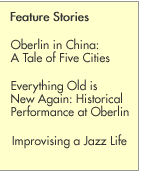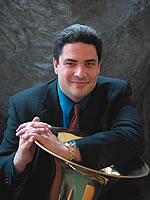
 |
|
Home :: Dean's Greeting Dean's Greeting The China tour. Thirteen days, nine concerts,
and five cities in one of the most remarkable countries in the world. Indeed a challenge—even for Oberlin. We performed in two of the great concert halls in Asia and we played in two of the worst. We encountered standing-ovation crowds, the People’s Liberation Army as a stage crew, nationally televised broadcasts, children who revered orchestral musicians as rock stars, and periods of travel and housing that challenged the heartiest of spirits. If you are curious about the quality of students at Oberlin today, then allow me to assure you that this tour comprised some of the most extraordinary individuals I have encountered in my career. Under difficult circumstances and tremendous pressure, they carried bags and large instruments, hustled to catch trains, persevered through equipment challenges and culinary adventures, and tirelessly gave their time for questions from all who were curious. Through it all, they played brilliantly, never letting circumstance interfere with artistry. Bravo. In a normative year, a tour to China arguably would be the most noteworthy event of the season. The 2005-06 year, however, exceeded all expectations following a remarkable gift by alumnus Stewart Kohl and his wife, Donna, to Oberlin’s Jazz Studies Program; a department imagined, developed, and honed to superlative stature through the continuing leadership of Professor Wendell Logan. The Kohls’ $5 million pledge of support is believed to be the largest gift ever in support of a jazz program in the United States. I am also pleased to announce a $750,000 grant from the Kulas Foundation, which represents the largest donation from the foundation in Oberlin’s history, and will certainly assist us in garnering support from the greater community for this building project. The Phyllis Litoff Building will be the premier jazz education facility in the country. It will also house offices for the music history and theory departments, as well as an unparalleled library and instrument collection. We also aspire to have the first LEED (Leadership in Energy and Environmental Design) rated music facility in the nation, thereby reflecting Oberlin’s pioneering spirit in both music education and environmental responsibility. I’m also pleased to say that in support of Professor Logan’s legacy in jazz studies, alumni James McBride ’79 and Leon Dorsey ’81 have initiated the Wendell Logan Scholarship Fund. In looking forward to this coming season, I hope many of you will join us for performances at both Carnegie Hall and the Miller Theatre in New York this year. In the following pages you will find information on both of these events. Thank you for your support of Oberlin, and I do hope that you enjoy this issue of the Conservatory magazine. It remains a privilege and honor to serve as Dean of the Conservatory of Music. David H. Stull Editor's Note - Effective April 22, 2010: Since this article originally appeared, the Litoff Building has been renamed. Oberlin's new home for jazz studies, music history, and music theory is now the Bertram and Judith Kohl Building. |
